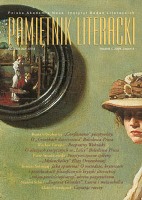„Eugenia Grandet”. Lustra i melancholia. (Z angielskiego przełożyła Agata Zawiszewska)
“Eugenie Grandet”: Mirrors and Melancholia. (Translated from the English by Agata Zawiszewska)
Author(s): Naomi SchorSubject(s): Literary Texts
Published by: Instytut Badań Literackich Polskiej Akademii Nauk
Keywords: BALZAC’S “EUGENIE GRANDET”; MIRROR STAGE; FATHER’S LAW
Summary/Abstract: Starting point of Naomi Schor’s article is a statement that French literary criticism that refers to Lacan’s considerations sees modern texts, primarily “Bildungsroman” and autobiographies, as developmental saga. Maturation in such saga is understood in accordance with Lacan’s thought as a process of an individual’s necessary passage from the Imaginary into the Symbolic, or a necessary abandonment of a mirror stage for the law of the Father. Schor formulates a thesis that developmental saga follows a different path from that of feminocentric examples of these genres i.e. such in which maturation of an individual is not linked with overcoming of the mirror stage but with regaining respect by it. It proves possible if the Imaginary is regarded not as a stage to be outgrown, but as an ineradicable constituent of human psyche. Schor proves her thesis when she analyses Balzac’s novel Eugenie Grandet. The heroine of this 19th c. romance about nuclear family succeeds in combining the Imaginary with the Symbolic due to her social position: after the death of her parents she decides to marry a suitor of fortune equal to her under the condition that their marriage was not to be consumed. In this sense she is a virgin and at the same time a wife, thus lives in the world of the Father’s law but does not surrender to them.
Journal: Pamiętnik Literacki. Czasopismo kwartalne poświęcone historii i krytyce literatury polskiej
- Issue Year: 2009
- Issue No: 4
- Page Range: 99-112
- Page Count: 14
- Language: Polish

